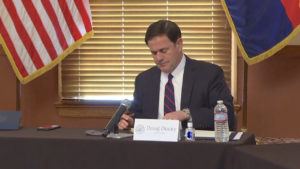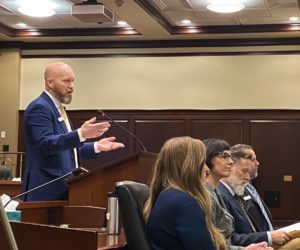Why chipping away at the Blaine Amendments is important for school choice
With 29 states currently considering school choice legislation, the education freedom movement seems unstoppable. But the legacy of a 19th century congressman hasn’t made it easy.
The “Blaine…

With 29 states currently considering school choice legislation, the education freedom movement seems unstoppable. But the legacy of a 19th century congressman hasn’t made it easy.
The “Blaine Amendments” are present in 37 state constitutions. They forbid public funds from going to religious education institutions, causing legal trouble for some school choice initiatives.
However, the amendments are relatively young and may prove to be short lived thanks to three recent Supreme Court decisions.
‘Driven by anti-Catholic bigotry’
Born in 1830, James G. Blaine served as U.S. representative, senator, and as Secretary of State – a prestigious resume despite losing the 1884 presidential election to Grover Cleveland.
But Blaine’s legacy is wrapped up in his failed attempt to amend the U.S. Constitution – an effort widely considered to be based on anti-Catholic and anti-immigrant sentiments.
“The Catholics were coming in in droves through Immigration in the 19th century,” Brittany Vessely, executive director of the Colorado Catholic Conference and former
director of state policy at EdChoice, told The Lion. “They wanted their own schools with their own public funding source, and that was the advent of the Blaine amendment.”
The amendments were “driven by anti-Catholic bigotry, because the common schools, which were the public schools back then, were largely Protestant,” Vessely explained.
Thus, Blaine proposed an amendment to prohibit any public funds or resources from being “under the control of any religious sect; nor shall any money so raised or lands so devoted be divided between religious sects or denominations.”
The federal amendment failed, but many states later adopted similar, education-minded resolutions in their own constitutions, known as “Blaine Amendments.”
‘We now have opportunities to expand school choice like never before’
Fast forward more than 100 years, and the Blaine Amendments have proven to be an obstacle for choice advocates, who are simply asking for the government to fund students equally, regardless of what type of school they want to attend.
In 2020, South Carolina Gov. Henry McMaster tried to use pandemic funds to start a voucher program, but was prohibited from doing so on account of Article XI, Section 4 of the state constitution, which reads:
“No money shall be paid from public funds … for the direct benefit of any religious or other private educational institution.”
Now, the South Carolina Legislature is trying to repeal its Blaine Amendment. If it were to succeed, it would be just the second state to do so. Louisiana was the first.
State representatives in Idaho recently attempted to do the same, but their efforts fell short.
Oklahoma’s Attorney General Gentner Drummond even walked back his predecessor’s opinion that religious public charter schools were constitutional, citing the state’s Blaine Amendment.
However, several Supreme Court rulings in the past six years have begun to chip away at the amendments’ constitutional legitimacy, smoothing the way for school choice programs to include religious education:
- In 2017, Trinity Lutheran Church, which operated a licensed daycare, applied for a state grant to purchase recycled tires to surface playgrounds and was denied due to its religious nature. Trinity sued on the grounds of the First and Fourteenth Amendment, saying the denial was religious discrimination. The Supreme Court voted 7-2 in favor of Trinity.
- In 2020, Kendra Espinoza, a low-income mother, applied for a tax-credit scholarship to help pay her child’s Christian school tuition. However, the Montana Department of Revenue stipulated that scholarships couldn’t be used at religious schools. The Supreme Court ruled 5-4 in favor of Espinoza, again saying Montana’s Blaine Amendment violated the First and Fourteenth Amendment.
- In 2022, several families, led by the Carsons, sued the state of Maine for not allowing their students to use tuition assistance programs to attend private, religious schools, despite the absence of a public school in their district. The Supreme Court ruled that Maine could not exclude religious institutions from public funding simply because they are religious.
“We have opportunities as a school choice movement nationally to expand school choice like never before,” Vessely says, “because of the precedent that the Supreme Court has now given us to make sure that funding is not prejudiced and treated totally with neutrality when it comes to religious education.”
And as Arkansas joined Iowa and Utah this week in passing universal school choice bills into law, it’s worth noting that three out of the five states with expansive or universal education voucher programs – Arkansas, Iowa, and West Virginia – do not have Blaine Amendments.



